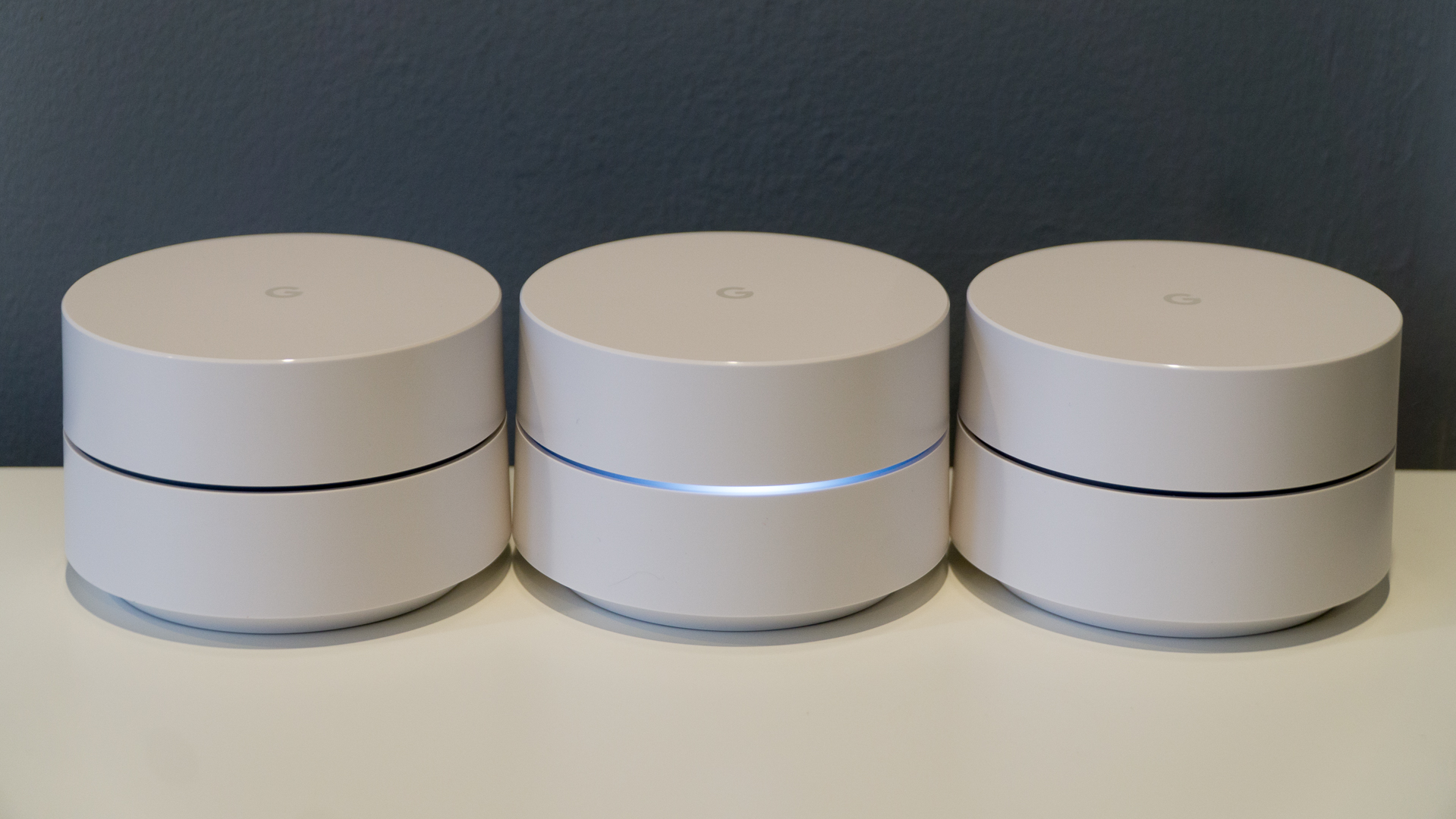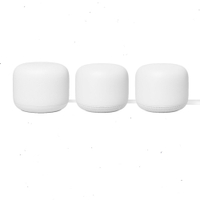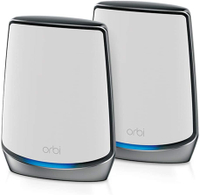TechRadar Verdict
Google Wifi is the easiest and most convenient router that we’ve had the pleasure of setting up, hands down. It may not be the most formidable or offer specific controls, but it more than makes up for any lack of depth in its unparalleled simplicity.
Pros
- +
Super-simple setup
- +
Great value
- +
Excellent design
Cons
- -
Limited hardware control
- -
Lower AC rating
Why you can trust TechRadar
The Google Wifi has been replaced by 2019's Google Nest Wifi. While it still available and being sold by some online retailers, you'll find the current generation to be a better value as they are both sitting at the same price point.
The Google Wifi has brought mesh systems to the masses in a way that no other mesh router has. Other mesh Wi-Fi systems may have come before it, but it's the one that has taken the mesh router revolution into the mainstream.
In essence, Google Wifi has set the standard of what a mesh Wi-Fi router should be, even if Samsung Connect Home or Netgear Orbi have been around longer. That’s because the Google mesh router combines a stripped-down design, straightforward installation, and full feature set with a very reasonable price tag. It also blends in well wherever you install it, and provides a robust, continuous connection no matter where you are in your area of coverage. Dead spots will be a thing of the past.
No matter if you’re dealing with a weak and intermittent internet signal or are ready to move on from a typical router setup, Google Wifi is an ideal solution thanks to its performance, features, and, of course, price.
Google Wifi review: Price and availability
- Expensive
- Can be bought separately or in packs of two and three for larger homes
Wireless Connectivity: IEEE 802.11a/b/g/n/ac, AC1200 2x2 Wave 2 Wi-Fi (expandable mesh; dual-band 2.4GHz and 5GHz, TX beamforming); Bluetooth Smart ready
Processor: Quad-core ARM CPU (each core up to 710MHz)
Memory: 512MB RAM
Storage: 4GB eMMC flash
Beamforming: Implicit and Explicit for 2.4 & 5GHz bands
Ports: 2 x Gigabit Ethernet ports per Wifi point (1 WAN and 1 LAN port each)
Dimensions: 4.1 x 2.7 inches (106.1 x 68.7mm; D x H) each
Weight: 12oz (340g) each
With what it has to offer accessibility- and features-wise, Google isn’t asking for much, particularly for what the Google Wifi can do. At the time of writing, this first generation Google Wifi cost $259 (about £204, AU$399) for a set of three units, comprised of one main “Wi-Fi point” (the one you connect to the modem or gateway) and two secondary Wi-Fi points. Google promises that three Wi-Fi Points can cover up to 4,500 square feet (418 square meters) in a location.
If you’re in the UK, the Google Wifi is available in both a 2-pack and a 3-pack, which will cost you £229 and £329, respectively. The Google Wifi is a phenomenal value – it provides more units for less cash than any of its rivals, like the Netgear Orbi, with other wireless mesh routers coming in at $400 (about £320, AU$520), at least, for the same number of mesh nodes.
It's worth bearing in mind that this is a much older model and that its successor, the Google Nest Wifi, is available for less. The newer Nest Wifi Pro, which sits at a slightly higher price point, is also on the shelves now.
Google Wifi has disappeared from Google's Australia product page, so there's no option to buy either the first-gen or the newly refreshed Google Wifi mesh router. This strongly suggests that while the Australian rollout is a bit further behind the US and UK's, it is likely imminent and will almost certainly see a similar price cut on the three-pack of networking points.
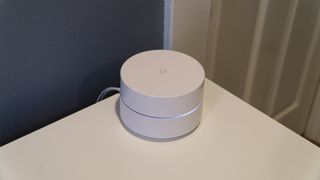
Google Wifi review: Design and setup
- Stylish and compact
- Easy to set up
Google not only has an edge in pricing on its hands, but it also has the sleekest designed Wi-Fi units and possibly the easiest setup of any offering. Each Google Wifi unit, a simple, little cylinder with a white LED band in its center, delivers the same capability.
This means that any Google Wifi unit can act as the core ‘router’ of the system, while the others can extend the wired signal, sent to the unit wirelessly, with their included Ethernet ports as well as wireless internet. All three units are powered through USB-C.
Setup is also completely smooth, just like the Google Wifi’s hardware design – using a free iOS or Android app to facilitate the whole process. We’re not going to dig into the nitty gritty of the process, but the Google Wifi App will allow you to configure your network by first scanning the QR codes on the Wi-Fi point connected to your modem or gateway.
The app will then ask you to give your new network a name and set a password, then pair any supplementary Wi-Fi points you have, by scanning their QR codes – you’ll then be able to name individual nodes in the app. Again, it only takes a short time for the first Google Wifi node to recognize additional nodes and for them to start working.
You are not going to get the same depth of access as even Netgear Orbi offers, so band switching isn’t a choice. However, Google Wifi does handle this behind the scenes automatically.
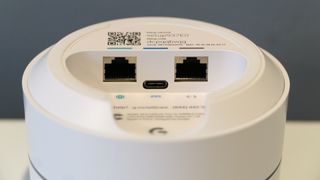
The Google Wifi app does provide more useful settings, like continuous monitoring of your network, as well as the points and devices connected to it. The app has an included internet speed test as well, like Ookla’s mesh test that measures the health of your Points’ connections, alongside a Wi-Fi test that measures your connection strength from within the network.
This is the most complete and sophisticated suite of controls we’ve ever seen on a Wi-Fi mesh system to date, in spite of its lack of dropdown boxes and toggles.
Additionally, you can prioritize bandwidth to one device for a time, control smart home devices and pause internet access to certain devices in a family setting – all from the confines of this app.
And, now Google has expanded Google Wifi’s Network Check feature to test multiple devices, so that you’re able to spot potential bottlenecks in your network, as well as rearrange your Google Wifi access points when you’re trying to optimize network performance.
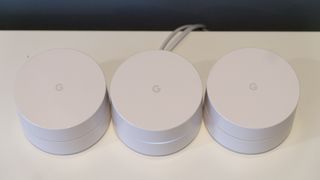
Google Wifi review: Performance
- Excellent performance
- Helps cover a wide area with Wi-Fi
Here is how the Google Wifi fared in our brief suite of tests (conducted on a 100Mbps service):
Ookla Speed Test 5GHz (Download | Upload):
Within 5 feet/1.52 meters; no obstructions: 101.41 | 117.83 Mbps
Within 13 feet/3.96 meters; three plaster walls: 97.05 | 118.67 Mbps
Ookla Speed Test 2.4GHz (Download | Upload):
Within 5 feet/1.52 meters; no obstructions: 47.53 | 96.72 Mbps
Within 13 feet/3.96 meters; three plaster walls: 50.95 | 82.98 Mbps
1.5GB Steam download 5GHz (peak speed):
Within 5 feet/1.52 meters; no obstructions: 12.6 MB/s
Within 13 feet/3.96 meters; three plaster walls: 12.2 MB/s
1.5GB Steam download 2.4GHz (peak speed):
Within 5 feet/1.52 meters; no obstructions: 7.2 MB/s
Within 13 feet/3.96 meters; three plaster walls: 8.8 MB/s
The Google Wifi is able to match, if not surpass, Netgear Orbi’s performance. Drawing the absolute most out of our 100Mbps Wi-Fi service, we have surely not seen any router be able to deliver the same service. But, the core difference here is that Google Wifi is able to bring this high performance to every room of our, albeit small, house.
We’re able to stream 4K video through Netflix to our Roku Premiere in the basement, as well as play Overwatch in the office where the modem is situated without any problems. Wi-Fi mesh systems like the Google Wifi aren’t focused as much on throughput as they are on coverage. Still, this product certainly delivers.
The traffic prioritization feature makes sure that your gaming session is receiving more of that critical bandwidth than the other devices in your house that are used most frequently for Facebooking and streaming HD videos. Additionally, the network can automatically repair itself should one or more of the Wi-Fi Points accidentally lose power.
Even though we know that Google Wifi operates its mesh system over existing Wi-Fi bands (2.4GHz and 5GHz) over the 802.11s mesh protocol instead of Netgear Orbi’s tri-band system that communicates over a second 5GHz Wi-Fi band, we haven’t seen a considerable difference between either’s performance. We do see marginally faster download speeds in MB/s on the 2.4GHz band from the Orbi over the Google Wifi. However, that could also be a possible anomaly.
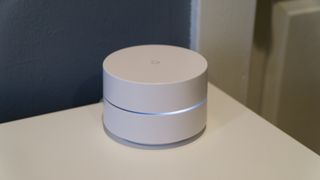
Where the Google Wifi really excels over similar routers is in its striking price to coverage ratio. You can get similar coverage from rivaling systems with fewer units, sure, but the flexibility you get from having more units – just in terms of minimizing dead spots – is massive.
Should I buy the Google Wifi?
The Google Wifi is the simplest and most effortless router we’ve ever set up, bar none. And, that’s considering the two extra devices required to finish the process. For a reasonably affordable price point, there are more units on offer than most of Google’s rivals, as well as the best setup and management app so far.
Despite the finer hardware controls it lacks, and the lack of AC3000 or AC2200 throughput, Google deliberated every toggle and test it could present in an easily understandable way through its app. There’s even bandwidth priority control. Pair that with a clean, uncluttered hardware design that’s better to showcase in plain view than any other routers we’ve seen yet. Except for its successor, at least.
Also consider...
Google Nest Wifi
The Google Nest Wifi is the follow up to the Google Wifi system, which means it comes with some handy extra features, including better Wi-Fi performance and built-in Google Home virtual assistant support as well. It's more pricey than Google Wifi, but it can often be found on sale.
Check out our Google Nest Wifi review
Netgear Orbi 5G WiFi 6 Mesh System
Netgear's Orbi system is probably the most recognisable brand when it comes to mesh Wi-Fi. It's expensive, but if you have a large property packed with loads of Wi-Fi devices, this is a wise investment. This new model includes Wi-Fi 6 for stronger signals, along with 5G data support that will keep you connected even if your broadband goes down.
Check out our Netgear Orbi 5G WiFi 6 Mesh System review
Asus ZenWiFi AX (XT8)
If you want a more affordable mesh Wi-Fi router, then this is a great choice, with excellent Wi-Fi speeds and useful parental controls. It's more pricey than the Google Wifi, but much less expensive than the Netgear Orbi.
Check out our Asus ZenWiFi AX (XT8) review
First reviewed April 2017
Joe Osborne is the Senior Technology Editor at Insider Inc. His role is to leads the technology coverage team for the Business Insider Shopping team, facilitating expert reviews, comprehensive buying guides, snap deals news and more. Previously, Joe was TechRadar's US computing editor, leading reviews of everything from gaming PCs to internal components and accessories. In his spare time, Joe is a renowned Dungeons and Dragons dungeon master – and arguably the nicest man in tech.
